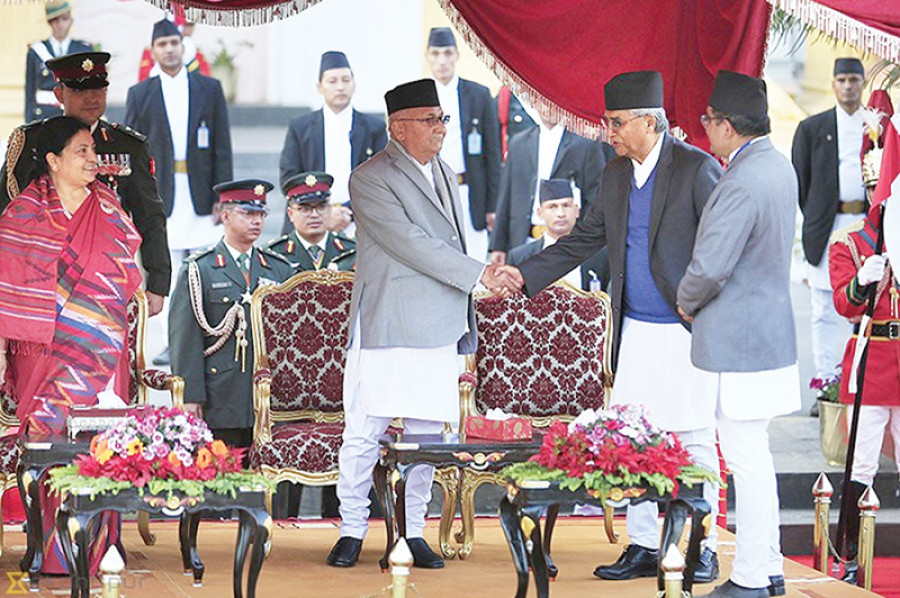National
Constitutional body vacancies irk House committee
Follow principle of proportional representation while making appointments, it says and once again summoning Oli to explain the delay.
Binod Ghimire
After the government dallied over the appointment of key office bearers to various constitutional bodies, a parliamentary committee had summoned the prime minister to its meeting on Thursday to discuss the issue. However, Prime Minister Oli didn’t show up.
He sent Minister for Foreign Affairs Pradeep Gyawali, instead to the meeting on Thursday.
The Parliamentary Hearing Committee has then directed the government to appoint officials to various roles at over a dozen constitutional commissions immediately. While it directed the government to do so at the earliest, it reminded authorities to follow the principle of proportional inclusion, members also summoned the prime minister to explain to them the reason for the delay, in-person.
“It is unfortunate that no steps have been taken towards appointing officials to various constitutional bodies for a long time,” said Laxman Lal Karna, chairperson of the committee. “The implementation of the constitution itself will not be complete unless office bearers are named to run constitutional commissions.”
“We have directed the government to make sure all chairs and members are appointed to all commissions at the earliest,” he said. None of the 13 constitutional commissions—most of them with powers to put checks on the government’s actions—is being run by the stipulated five office-bearers.
The National Human Rights Commission, Women’s Commission, Dalit Commission, Inclusive Commissions and Indigenous Nationalities Commission are being operated without a single office bearer appointed.
The National Human Rights Commission was the last constitutional commission to operate with all of its stipulated members and its chief named. But after its members’ six-year tenure ended last month.
Article 284 (3) of the Constitution of Nepal says the Constitutional Council has to recommend candidates for positions in constitutional bodies a month before the positions fall vacant. However, key positions in some commissions have remained vacant ever since the promulgation of the new constitution in 2015.
The hearing committee, a joint committee comprising both members of the House of Representatives and the National Assembly, had summoned Prime Minister KP Sharma Oli to its meeting on Thursday, however, Oli didn’t come citing his busy schedule.
Karna said the committee has decided to summon Prime Minister Oli, who also chairs the Constitutional Council, again. “We aren’t happy that Oli has been declining our request,” he said. “We have decided to summon him again.”
Minister for Foreign Affairs Pradeep Gyawali, who was present during Thursday’s meeting on behalf of Oli, said the council’s meeting hasn’t been held for the lack of quorum as member and leader of the opposition, Congress chief Sher Bahadur Deuba, has been reluctant to participate in its meetings.
The six-member council has the chief justice, the speaker and the deputy speaker of the House of Representatives, chairman of the National Assembly, and leader of the main opposition as members. The minister for law and justice is also present when the appointment is related to the judiciary.
The deputy speaker’s position has remained vacant for around a year after the resignation of Shiva Maya Tumbahangphe, who assumed office as law minister, in January.
Responding to Gyawali’s comment, Karna said it was the responsibility of the executive to ensure the council’s meeting was held on time. The council hasn’t convened since March 25 when it recommended Dinesh Thapaliya for chief election commissioner.
Prime Minister Oli and Deuba met in Baluwatar last week amid a brewing crisis within the ruling Nepal Communist Party, ostensibly to fill the vacant positions in the constitutional commissions.
The parliamentary committee also has directed the government to come up with a law to fully implement the provision of proportional representation envisioned by the constitution. Article 42 of the constitution makes it mandatory that the government ensure proportional representation of all communities in tate machineries.
“However, political appointments and recommendations to the constitutional commissions haven’t been made by adhering to this constitutional provision,” said Dev Gurung, a member of the committee from Nepal Communist Party.




 18.12°C Kathmandu
18.12°C Kathmandu














